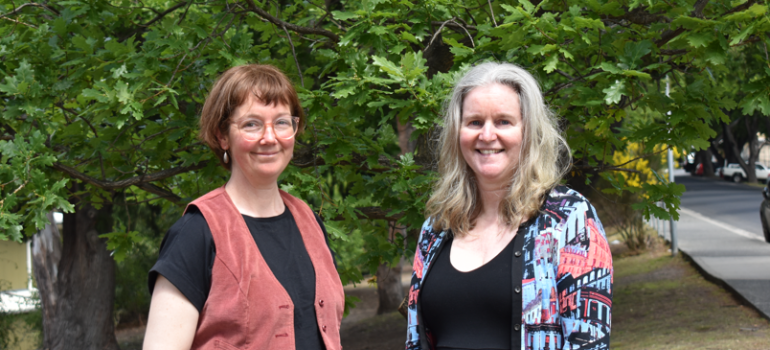
Climate anxiety can make us feel alone. That’s where Climate Cafés come in.
Therese and Molly are about to begin hosting Climate Cafés in the nipaluna/Hobart area.
What is a Climate Café? Is there cake?
Molly: Climate Cafes are places where people get together to share difficult feelings about the climate crisis.
Thinking about the climate crisis can bring up emotions like anxiety, guilt, and sadness. It's often hard to talk about these without feeling like a downer. That's why we have Climate Cafés.
If we meet in person, we always try to have some tea and cake. What problem isn’t improved by cake?
Why did you want to start a Climate Café?
Molly: I'm convinced climate disruption will be an everyday part of our lives in the next decade. To prepare, I want to create a strong community now.
I believe we'll become more connected in the future; I look forward to a slower, local way of life. Climate cafes are one way to work towards this. Plus, I have a 13-year-old son, and I think it's important for his mental health, to see the grown-ups in his life acting on climate.
Therese: I’m a future thinker too. I look back at me in the 1980s starting my science degree thinking surely, we won’t let carbon dioxide in our atmosphere get to 350ppm!
My first bout of climate distress was in 1990 when we crossed that safe threshold.
It’s hard not to be angry at our leaders and it’s easy to fall into despair. However, we owe it to our young people to make the future as good as we can – every tenth of a degree we don’t heat up is a benefit.
I feel passionate about helping people to cope with their climate distress so we can all be productive and positive and make a difference.
What happens at a Café?
Therese: People can explore their thoughts, feelings, and experiences of climate distress. It’s not a space to debate science, and it’s not a therapeutic space. We can refer people to climate-aware mental health practitioners if required.
Molly: They are about sharing feelings openly and honestly. It's a safe space where everyone's emotions are respected.
As people talk, common themes emerge, making folks feel less alone. These gatherings aren't about suggesting solutions; they're about providing support and unity. They are just one piece of what we'll need in the future to address climate challenges.
What do you hope people leave a Climate Café feeling?
Molly: That lovely sense of validation you feel when you have expressed your truth and been seen, heard, and supported.
Therese: It’s a chance to meet like-minded people with similar values. Finding a new friend and having someone to talk to or work with on some sort of climate action would be the ultimate outcome.
How do people find a Climate Café?
Molly: Psychology for a Safe Climate runs regular Climate Cafés online. You can start there and get a feel for what they are like.i
We need more local facilitators. Please consider doing the facilitator training and joining us!
Email us to register for our next in-person Café at climatecafehobart@gmail.com. If you know of a free space we can use for a Café, we’d love to talk to you!